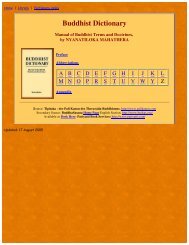With my respects to the Venerable Nyanatusita Thera
With my respects to the Venerable Nyanatusita Thera
With my respects to the Venerable Nyanatusita Thera
You also want an ePaper? Increase the reach of your titles
YUMPU automatically turns print PDFs into web optimized ePapers that Google loves.
world of intelligence. It follows, <strong>the</strong>refore, that this region of truth is not <strong>to</strong> beinvestigated as a thing outward <strong>to</strong> us and so only imperfectly known. It is within us.Here <strong>the</strong> objects we contemplate and that which contemplates are identical—both arethought. The subject cannot surely know an object different from itself. The world ofideas lies within our intelligence. Truth, <strong>the</strong>refore, is not <strong>the</strong> agreement of ourapprehension of an external object with <strong>the</strong> object itself. It is <strong>the</strong> agreement of mindwith itself. Consciousness is <strong>the</strong> sole basis of certainty. The mind is its own witness.Reason sees in itself that which is above itself as its source; and that which is belowitself as still itself once more.” 19The divisions of knowledge which Plotinus makes are interesting <strong>to</strong> <strong>the</strong> Buddhist. Thefirst is opinion, <strong>the</strong> second science, and <strong>the</strong> third illumination: The first is explained asthat which is gained by means of <strong>the</strong> senses. It is perception (pratyaksa); <strong>the</strong> second refers<strong>to</strong> inference (anumána); and <strong>the</strong> third, insight (avabodha). Reason has <strong>to</strong> be subordinated<strong>to</strong> <strong>the</strong> last knowledge mentioned here. It is <strong>the</strong> absolute or final knowledge founded on<strong>the</strong> identity of mind-that-knows and <strong>the</strong> object perceived. He also speaks of evolution(saívaþþana) and involution (vivaþþana). How can we know <strong>the</strong> Infinite? Not by <strong>the</strong>reasoning process. Reason's business is <strong>to</strong> distinguish and define. Only by a facultysuperior <strong>to</strong> reason can one apprehend <strong>the</strong> Infinite.That can be done by entering in<strong>to</strong> a state in which one is no more in a finite state. Thatstate is <strong>the</strong> state of ecstasy (jhána) or full absorption. By entering that state one becomesfree of finite anxieties. Ecstasy is not a frequent occurrence even in Plotinus' case. Thereare different ways <strong>to</strong> ecstasy. They are: <strong>the</strong> love of beauty which exalts <strong>the</strong> poet;devotion <strong>to</strong> just one thing; <strong>the</strong> assent of science <strong>to</strong> <strong>the</strong> philosophical thinker; and, lastly,love and contemplation or prayer by which a devout soul in its moral purity tends<strong>to</strong>wards perfection. The soul nei<strong>the</strong>r comes in<strong>to</strong> being nor perishes; “nothing thatpossesses real being can ever perish.” But souls that have lived wrongly will bereincarnated in <strong>the</strong> bodies of lower animals. The <strong>my</strong>stical ascent appears as “aprogressive stripping off of everything alien <strong>to</strong> <strong>the</strong> purest nature of <strong>the</strong> soul” whichcannot enter in<strong>to</strong> <strong>the</strong> holy of holies while any trace of worldliness clings <strong>to</strong> it. It is called“a flight of <strong>the</strong> alone <strong>to</strong> <strong>the</strong> alone.”Plotinus gives many descriptions of <strong>the</strong> <strong>my</strong>stical trance, but he thinks that <strong>the</strong> trance isreally ineffable. The vision of <strong>the</strong> One is an exceedingly rare happening. It is <strong>to</strong> beearned only by intense contemplation and unceasing self-discipline.The ethical scheme is threefold: purification, enlightenment and unification. Goodcitizenship is <strong>the</strong> prelude <strong>to</strong> <strong>the</strong> course. In this system, as in Buddhism and a few o<strong>the</strong>rIndian systems, <strong>the</strong>re is nei<strong>the</strong>r media<strong>to</strong>r nor redeemer.There is nothing <strong>to</strong> prove that <strong>the</strong> teaching of Pla<strong>to</strong> was founded on a system ofmeditation practice or yoga for <strong>the</strong> penetration of actuality. But Plotinus was out and outa yogi and is nearer <strong>to</strong> Buddhism than <strong>to</strong> Pla<strong>to</strong>nism in <strong>the</strong> higher stages of his doctrine.19 Plotinus, Letters <strong>to</strong> Flaccus, quoted in Tertium Organum: The Third Canon of Thought, a Key <strong>to</strong> <strong>the</strong>Enigmas of <strong>the</strong> World, by P. D. Ouspensky, translated from <strong>the</strong> Russian by Nicholas Bessaraboffand Claude Bragdon, Manas Press, Rochester, New York, 19208
















